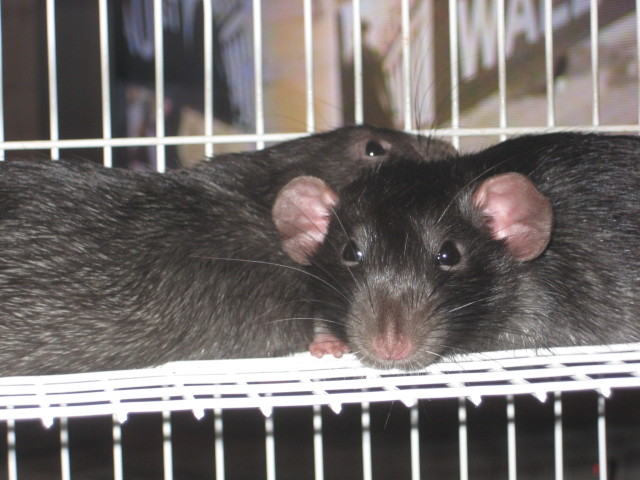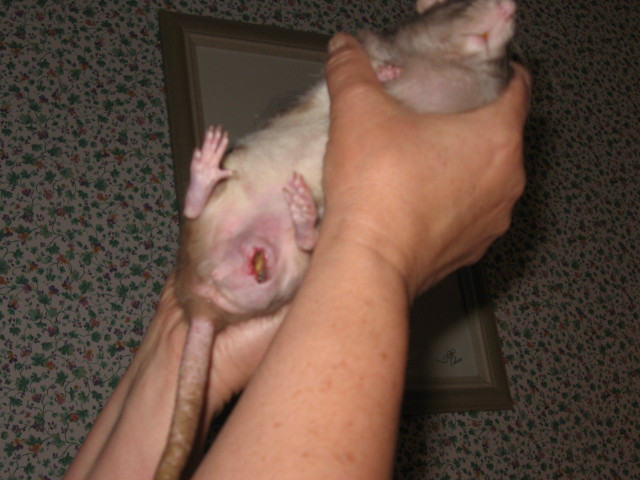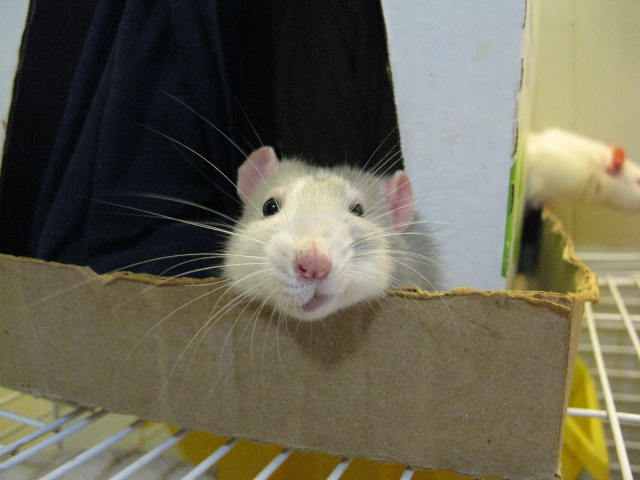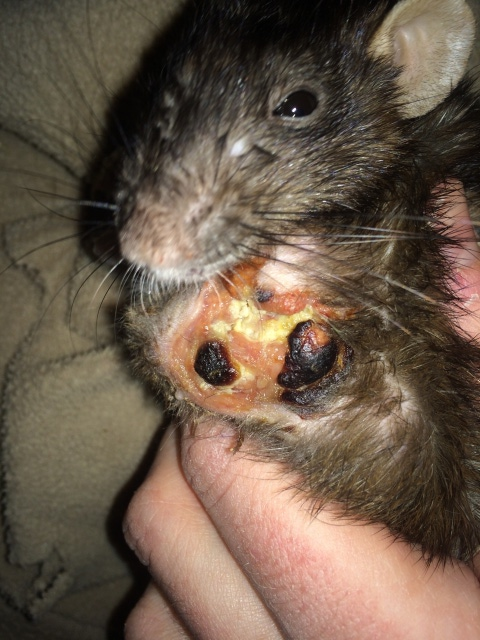QuestionHi Sandra. I was hoping you could give me some insight into a fairly complicated rat problem. I've been a rat owner for about 18 years and have never seen anything like this. So I will start from the beginning. Last year I worked at PetSmart (horrid place) and met a blue rex rat who was sick when she was delivered to us. It was a pretty basic respiratory issue, but left untreated, she ended up with pneumonia. After a LONG treatment process, she seemed to perk up, but wasn't quite 100%. The store said that they could not afford her vet care anymore and were going to put her down, so I adopted her immediately and quit on the spot. Since then, she's seen a few different vets, all of whom said she had some lung scarring and would always have some breathing problems. I accepted that. I own another 16 rats, aside from her, who are all very healthy. She was isolated from them for about 2 months before I introduced one of my other girls to her. They got along wonderfully and lived together for another two months before I felt it was safe to introduce her to a cage of my youngest girls (all are a year or younger). About 3 months into this, I started noticing significant hair loss on her back. Given that she is a rex, I didn't think much of it. Then I noticed that she was dropping a lot of weight. I took her back to the vet, who said to just feed her more. Seems to be common sense. So I started feeding her more. I feed my rats a homemade vegetarian, but it is supplemented with nuts and soy meat products to make sure they get the protein they need. They don't have access to food all the time, they get a breakfast with fruits and grains in the morning and a dinner with veggies, protein products, and more grains at night. Of course it is supplemented with healthy treats throughout the day. None of my other rats are losing any weight, and in fact some of them get a little pudgy from time to time, so I know she has access to enough food. I thought perhaps she wasn't getting enough, and all the other girls were eating everything, but I've watched and this isn't the case. Finally, the other day, I noticed that in the bare areas that I can see her skin, she is turning orange. My mother, who works as a vet tech, said that she has seen that in animals with diabetes and kidney failure, and for a rat, I'm not sure how to go about managing that. I also noticed that she had discharge from her eyes this morning, which I had not seen until today. Otherwise, she is perfectly healthy. Her activity level is normal, she has an appetite, drinks water regularly, and loves to play.
So I suppose my question to you is, what could be causing this? Have you heard of something like that in rats?
It was suggested to me that I changed something in the environment, but I can't imagine that there is anything to hurt them in my house. I use nothing scented in my house, no perfumes. They are kept in large ferret cages, on yesterday's news. The temperature doesn't change, the diet is consistent. I'm just at a loss. I've made an appointment with a small animal specialist in Denver, but he won't be able to see her until next week.
So any ideas? I really appreciate any input!
Answer
I wish you can show me a photo. If you can, please send it to sandysrittercity@yahoo.com
This orange color...is it under the skin or is it more like a residue on the skin?
Is there an odor to her body or her urine?
Is she drinking more than usual?
Does she have loose stools?
Diabetes is not very common in pet rats but kidney disease is. Usually rats that are fed diets high in protein can develop it since high protein diets are too taxing on their kidneys. Weight loss is one sign, but weight loss is also a sign of numerous ailments so its too hard to pin this on kidney disease.
I am leaning more toward it being hormones if anything, but again I need to ask a few more things first and as you know this is only an educated guess and the fact your seeking the aid of a medical professional is a good idea no matter what my opinion is.
As for kidney disease, you would also notice increase water intake but a decrease in urine output.
http://www.freewebs.com/crittercity/heartandkidneydisease.htm
Also as for diet goes, usually we advise to allow the rats to be self feeders rather than scheduled feeders. Believe it or not, rats do not get fat from over eating. They usually do not over eat but eat when hungry. What makes a rat fat is a diet high in fats etc...
I hate to suggest this to you since you probably have always fed them this way, but just to let you know that we usually dont advise it that way for various reasons, and one being the fact some rats dont like to eat when other rats do and some rats that want to be alpha wont let other rats eat etc...so its best to always leave food out. There are great diets for rats on my website that are homemade.
http://www.freewebs.com/crittercity/ratsandahealthydiet.htm
I went ahead and (hope you dont mind) checked up on vets in the Denver area and there are no certified exotic vets in Denver and if the vet is listed as a small animal specialist, this only means they specialize in small animals which means dogs/cats. Exotic vets that see rats etc...are listed as an exotic companion mammal Vet. Just so your not confused. Many people see in an ad etc...that its a small animal clinic or a small animal vet and this simply means small animals rather than large animals like horses and farm animals. Its the small mammal/exotic medicine you need to find which is hard since there are few vets that really truly have the knowledge about our furry friends. There are less than 130 certified avian/exotic vets in the entire world and there are just a few hundred that have a special interest in companion mammal medicine. With rats and other small mammals becoming more popular though, Vets are seeing the real need for Vets that are up to par on their care and are starting to take more of an interest in learning about their ailments/diagnosis/prevention and treatment.
I decided to give you a few names in your area that does see exotics.
Below I have given you two clinics that will care for you rat. I am hoping your not far from this place as this would be ideal for you to go to. The vets there have strong interests in exotics companion mammal veterinary medicine. I have no idea your location but when you said Denver I assumed that is your neck of the woods so I went ahead and got my list of Vets that are part of the Association of exotic mammal vets hoping to find someone near you and I wanted to make sure I had the credentials for the vets at these two facilities rather than suggest a practice that has limited knowledge on rat care.
Homestead Avian & Exotic Animal Hospital
6900 South Holly Circle
Englewood, CO 80112
(303) 290-8233
Arapahoe Animal Hospital
5585 Arapahoe Ave
Boulder CO 80303
Phone: 303-442-7033
Website: www.arapahoeanimalhospital.com
Animal Central
8308 Church Ranch Blvd
Westminster CO 80021
Phone: 303-469-7387

 Not lung tumors at least
QuestionQUESTION: Hello,
Been writing you about my boy
Not lung tumors at least
QuestionQUESTION: Hello,
Been writing you about my boy
 Jenna is doing great!
QuestionQUESTION: Hello. Im writing back to let y
Jenna is doing great!
QuestionQUESTION: Hello. Im writing back to let y
 tight left side of face
QuestionFlurrys face
QUESTION: My rat Flurry has
tight left side of face
QuestionFlurrys face
QUESTION: My rat Flurry has
 Older sick rat with abcessed tumor
QuestionQUESTION: Hello Debbie,
I have had 7 rats the
Older sick rat with abcessed tumor
QuestionQUESTION: Hello Debbie,
I have had 7 rats the
 rat eye issue
Question
normal eye bad eye
Hi again nata
rat eye issue
Question
normal eye bad eye
Hi again nata